
The first night in Goma, I did not sleep well. A weird sound woke me up around 1:00 a.m. It sounded as though someone was crying--not the normal kind of crying, but a painful crying. The sound was intermittent. I took a flashlight and walked out of my room. Catherine’s room was about three rooms away from mine. I walked passed her room. All was quiet there. The guards, sitting by the hotel main gate, saw and acknowledged me. I went back to my room and stood by the door for a while. I heard the same sound again. This time I detected it coming from across the street. I realized it must be an owl. There is a common belief across the Congo that hearing an owl hooting at night, or anytime for that matter, is not a very good sign.
When this all took place, it was pitch dark, not because everyone decided to switch off their lights, but because of a power outage, commonly referred to there as delestage. Various neighborhoods of Goma are furnished with electricity intermittently. This situation has been occurring since the time Mobutu was in power. It’s such that electricity is available from six in the morning till noon in one area, and from one in the afternoon till six in the evening in another area. One thing is sure: every night between nine and eleven, there is a general power outage all over the city of Goma that will go on till the next morning. Those who can afford it have learned to rely on electricity powered by generators. For the majority of the population, however, candle lights or lamplights serve as sources of illumination, and cooking is done using charcoals on grills called mbambula.
It’s unthinkable that in Goma and so many other cities in the Congo, electricity is still seen as a luxury. For years, the Congo hasn’t been able to use its vast potential of hydroelectric energy to its fullest extent. Ironically, the Inga Dam, located in the western part of the Congo, has the potential to furnish electric power to the whole continent of Africa. This possibility has remained unexplored to this day, even though it could turn out to be a great source of revenue for the country’s budget.
I could not sleep for the rest of the night. From time to time, I would step outside onto my balcony not only to get some fresh air, but also to hear the flow of the lake on the shore below.
The early morning hours began with the sound of military recruits running down the street for their morning exercise. As the sun was rising, I could see men, women, and children going to or coming back from the Lake Kivu with yellow containers. In addition to the electric power problem, there is also a water shortage problem. Tap water comes and goes without warning. When it’s available, people collect it in as many containers as they can (marmites, gallons, etc), mostly for cooking and drinking. If they need water to wash the body, the ordinary people rely on the salty water from good old Lake Kivu most of the time. A rainfall presents another opportunity to collect water.
I thought about the many useful things these men, women and children could have been doing with the time it took making trips to the lake to fetch water or wait for the return of electricity in their houses. How do hospitals operate under such conditions? With electricity being quasi-existent, how do students study at night? What do those in power think about this situation? Isn’t this a sure way to slow the development of the area, and of the country, when people cannot concentrate on things of importance because they lack basic needs?
No matter the multiple answers or justifications one could give, simple things like electricity and water just need to be accessible to all, especially for a country like the Congo.
